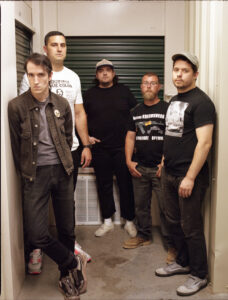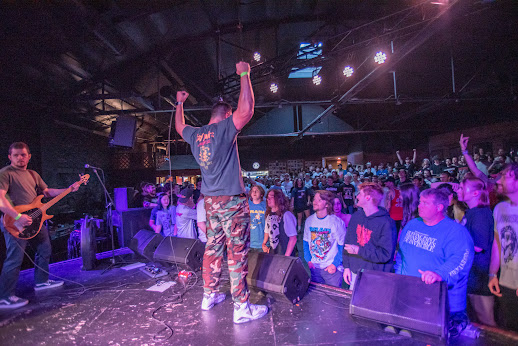A peer recently pointed out to us how rare it is to come across longevity in the hardcore scene, but one Kansas City band is already on their third LP. On Saturday, August 5, Spine celebrates their record release with a slew of other hardcore bands at Recordbar.
The inner struggles of the band’s vocalist Antonio Marquez come through on the album. The son of Cuban-American immigrants, Marquez uses all 12 songs (most clocking in under a minute) to detail his trials and frustrations, with some lyrics in Spanish and featuring samples of salsa music and voicemails from Antonio’s family. We sat down and talked with Antonio about the album, which you can also listen to below.
IHLM: What drew you to the Kansas City hardcore scene?
AM: The biggest draw to me as a kid was wanting to build and even more personal connection to the love of music but with the bands in my own backyard. I’d go to see these bigger acts and get exposed to local bands and always wanted to be a part of that culture. Once I was part of it, I wanted to make sure that I made it even more accessible and open to new people as possible. But it was all just a progression from big shows, to smaller shows, to wanting to stay connected to what was moving on a more grassroots level.
IHLM: Your family identity plays a big role on the album. Is this something that’s always prevalent in your music? What other themes do you feel it’s important to tackle in your art?

AM: It was always prevalent in our music. The first time I did a song in Spanish was our first LP Time Has Gone. I wasn’t comfortable with doing it even though my bandmates would encourage me to do so. Back then, and even when I was coming up in the scene, doing a song in a different language was an automatic skip for a lot of people. If it wasn’t in English, it had no meaning. And to me, as important as it was to do that, I felt like it would turn people off and wouldn’t be accepted. As the band continued, I noticed more and more people in the scene that didn’t see me for who I was. It was colorblindness and by doing so, disregarded my history and culture that I carry with me all the time. I wanted to really incorporate the struggles I have with being accepted as first generation both inside and outside of the community (specifically the latino community but applies to all cultures). While also calling out those who don’t look like us or share our experiences who constantly tell our stories on our behalf and contradict our experiences. Simply because they read about it in a book. I was cautious about wanting to tackle those themes on this record, even though it was so important to me. Any person that has foreign born parent(s) has probably dealt with some combination of these things before. Never enough for this side to be accepted and never enough for the other side to be accepted. I just wanted people to know that you can stand on who you are, and you are accepted, and your story is important and should be yours to tell. Obviously this was part of the story I was weaving with Raíces as I tackled other personal themes that have shaped me to where I am today. But I wasn’t going to be shy about that and made it a point for this record to be as direct in message than we’ve ever done.
Another thing I wanted to do was immortalize my mother and grandmother in a way that hadn’t been done before. My mother suddenly passed nine years ago and I decided to write “Madre Mía” about that experience. While also having my brother (who has never done music before) share a verse with me as we played the last voicemail, she ever left me. I think she would’ve been proud of that as she was always one to encourage me and my art. To know she’s a part of it in such an obvious way, would make her proud.
Visually I wanted this to be a departure from what we had done previously. I wanted the art to contrast with the music and the photos I sourced were done in a way to be both interesting but also illicit a lot of questions. I love things that both visually and sonically contrast in hope it gets people thinking and to hopefully broaden their viewpoint.
IHLM: What do you hope people will take away from your new album?
AM: Raíces is about my roots and what makes me who I am. Each song is specific to my journey in life. My biggest takeaway would be to be comfortable with who you are and to not be afraid to speak up for what you believe in. Don’t let others who aren’t from the same culture to dictate how you should view your own. You don’t have to speak the language to claim your culture. If you are, then you are and that is enough. If you carry it with you, that’s all that’s important. Embrace the pain, embrace the love, but just like I say in “P.O.C.” a lot of times it’s a “culture cleansing, anglo mission” in terms of speaking our story. “When I stand, when I speak, it’s my cause, P.O.C.”
IHLM: Why do you feel it’s important for the Kansas City hardcore scene to thrive?
AM: It’s important because of the inspiration it can give to younger people starting their own path, creatively or not. I basis of what a community can be like and how an idea can carry so much power and weight. I’ve been a part of this for over 20 years in a range of capacities. I’ve learned a lot and done my best to give a lot, and I’ll continue to do that. But if we don’t have the younger generation coming in, feeling welcome/accepted, this thing we love dies. And we can’t ever let that happen.


